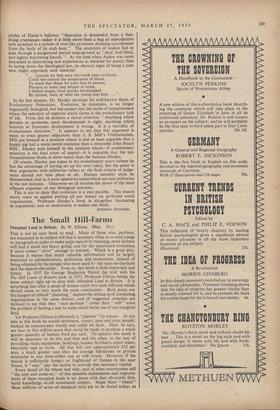A Vast Parable
Evolution in Action. By Julian Huxley. (Chatto & Windus. 9s.) THE role of populariser is often despised. But reading this book one sees how Dr. Huxley brings qualities of imagination that a poet may well envy to explain matters which are usually locked within com- partments of specialisation. In one chapter he is occupied in speeding up time enormously to demonstrate the process of biological improvement. In another he slows it down to show us how, given the enormous amount of time which is the history of evolution, the incredibly improbable results of natural selection can be obtained. Or he speeds it up again and fascinates us with a debate between the reptiles, the mammals and the insects. The development of the mammals is held up for fifty million years, while the reptiles rush forward radiating out in all those types whose fossils look today like experiments for some of our own more monstrous armoured machines. The reptiles prove inefficient, and then "it is the mammals' opportunity, and their great deployment began, continuing in waves of improvement over another fifty million years." The insects are locked within their too-perfected social organisations, having failed to develop to a sufficient size and in such a way as to become warm-blooded.
Like all good artists Dr. Huxley constructs his picture from minute particulars. Sometimes he concentrates on these, and gives us a "close-up" of a baby herring-gull reacting to the yellow bill and red patch near the lower mandible of the parent bird as it takes a small portion of mother-regurgitated food. Or he will draw our attention to an example of the phenomenon called "industrial melanism"— that many species of moths have become virtually black in industrial towns, having acquired a new protective colouration for the indus- trial era.
The world of evolution might really form the subject of a Universal Comedy. In many respects it has parallels with the Christian concept of heaven, purgatory and hell. Some species have degenerated in the course of time, and live existences like the creatures in the lowest circles of Dante's Inferno: "Sacculina is descended from a free- living crustacean: today it is little more than a bag of reproductive cells attached to a system of root-like processes draining nourishment from the body of its crab host." The ancestors of snakes had to pass through a purgatorial period underground as "deaf, half-blind, and legless burrowing lizards." At the time when Auden was more interested in discovering new experiences as material for poetry than in laying down the theological law, he showed signs of being a poet who might approach such material: " . . Lizards my best once who took years to breed,
Could not control the temperature of blood. To reach that shape for your face to assume, Pleasure to many and despair to some, I shifted ranges, lived epochs handicapped By climate, wars, or what the young men kept . . ."
In his last chapter, Dr. Huxley develops his well-known thesis of Evolutionary Humanism. Evolution, he maintains, is no longer organically biological, but has passed into the realm of consciousness where the selection of superior social forms is the evolutionary task of life. From this he deduces a moral criterion: "Anything which permits or promotes open development is right; anything which restricts or frustrates development is wrong. It is a morality of evolutionary direction." It appears to me that this argument is open to even graver objections than J. S. Mill's Utilitarianism. Mill put himself in a position where it was at least arguable that a happy pig had a more moral existence than a miserable John Stuart Mill. Huxley puts himself in the position where—if evolutionary selection is the final court of appeal—it is arguable that the late Generalissimo Stalin is more moral than the humane Huxley.
Of course, Huxley can argue in his evolutionary court (where he has the advantage of having set up his own rules), but the point is that arguments with utilitarian values as the final criteria of judge- ment should not take place at all. Human morality must be disinterested; that is, it must appeal to values which are non-utilitarian in the last instance. Otherwise we all become the slaves of the most efficient organiser of our biological interests.
This is not to deny that evolution is a vast parable. The insects surely warn us against putting all our money on perfected social organisation. Professor Huxley's book is altogether fascinating as exposition; and as controversy it makes one think.
STEPHEN SPENDER.



















































 Previous page
Previous page